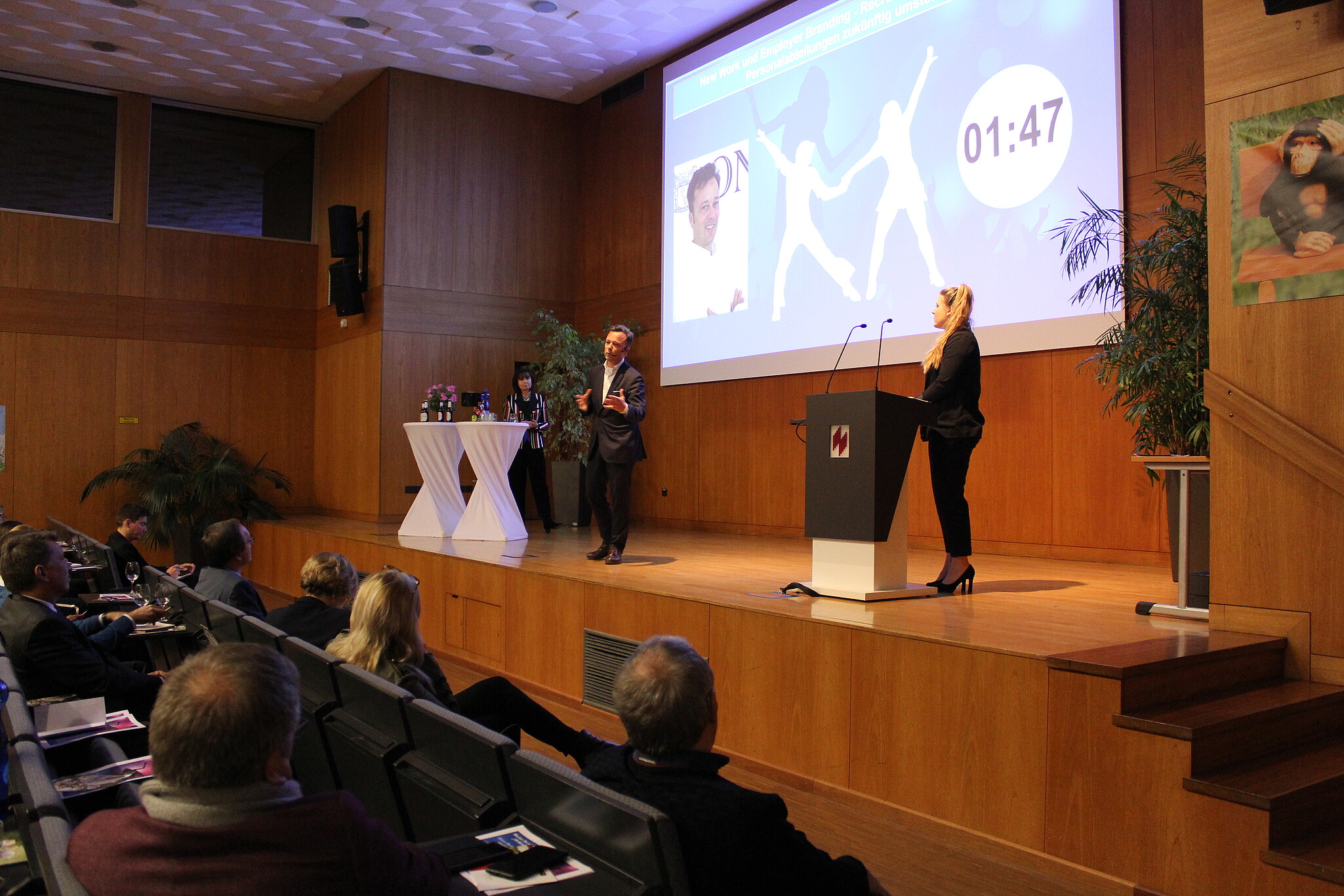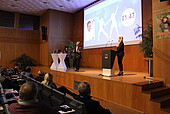On Wednesday, January 23, 2019, Frank Kohl-Boas, Head of Human Resources at DIE ZEIT-Verlagsgruppe, and Prof. Dr. Jutta Rump, Director of the Institute for Employment and Employability, joined forces to "dance" the HR Mambo for the second time in a row in Ludwigshafen. In three-quarter time, the two presented their theses on the future of work.
Immediately after Prof. Dr. Peter Mudra, President of the Ludwigshafen University of Business and Society, welcomed the guests, moderator Jette Altmann introduced the first round of the HR Mambo, in which the two protagonists, Frank Kohl-Boas and Jutta Rump, presented their four-minute statements on various topics relating to the working world of tomorrow.
Will digitization create jobs or destroy them?
According to Kohl-Boas, what we are currently experiencing is by no means new. Every day, he said, jobs are being eliminated and new ones are being added. "We already experienced the same thing with the invention of the wheel and the steam engine." The difference from back then, however, is that the topic of digitization is perceived by the population with much more uncertainty, he said. "In the past, you could still be sure that only heavy, physical labor would be affected. Today, it's also activities such as those in the finance and insurance industries that are changing rapidly, so many employees there can no longer be sure what their work will look like tomorrow."
Rump noted that while digitization is creating many new jobs, it is also likely that certain activities will be eliminated. "I believe that many routine cognitive and manual activities - even in complex areas - will be taken over by 'colleague robots' and 'colleague algorithms' in the future." The question then, he said, is what alternatives will be offered to those affected. "In this context, our demographic development could prove to be a real stroke of luck."
What do the job models of the future look like?
Rump began by emphasizing the need for a generalist approach. "Adequate specialist knowledge will continue to play a central role, but it will become increasingly important to be positioned in a generalist way so that it is easier to rotate between different tasks." In addition, there would be a very fundamental question: "Will we still see "the" permanent, full-time, one-place, one-employer contract in the future, or will we have to think about variable work models?" In this context, the topic of flexibility and sovereignty of time plays a very important role, he said, because otherwise you quickly feel like the "hamster in the wheel" as the pace increases.
"In Germany, if someone is employed as a freelancer or via an employee leasing agency, words like 'precarious', 'second-rate' or similar quickly come up," Kohl-Boas stated. However, this image has changed fundamentally in some areas. In IT and creative professions, many do not want to work in a traditional employment relationship at all. "Journalists write for us, they want to work for us this week, maybe for the Süddeutsche next week and then for us again." Above all, he said, a differentiating understanding needs to be created in society. "Not being a permanent employee these days doesn't mean being second-rate per se, it just means moving within a different framework."
Recrutainment - Will HR departments have to change in the future?
Kohl-Boas pointed out that recruiting does not necessarily have to be entertaining. Rather, it is about meeting at eye level and being authentic as an employer. He also said that one has to think carefully about "who" selects the candidates "how." "If Schmitt is always hiring Schmitt, then you have a problem in the long run." A consensus-based selection process, in which employees who are better than oneself are also hired, has a much greater effect than entertaining recruiting, he said.
Rump equally questioned the issue. "Should recruiters actually become entertainers now?" If that is the goal, she said, HR departments will also have to take on the role of event managers in the long run. "I wonder if that's really the point." Recruiting, he said, is more about finding employees who are the exact right fit. The employee needs to be able to say with fervor, "I'm proud to be here!" This goal cannot be achieved simply through an entertaining recruiting process.
Leadership success - is it greater when employees choose their own leaders?
Kohl-Boas described leadership as the biggest wheel that can be turned to influence a company. However, he said, it matters less whether a leader is directly elected by employees. "Nowadays, it's much more important that she can also honestly say, 'I don't know everything either, and I can't plan our business development for three or five years anymore.'" Leading, she said, is a tough job that is all about preparing oneself and one's workforce for the most likely scenarios.
Rump added that her experience with this issue has been positive so far. "In a higher education environment, most leaders are elected anyway. I don't have the impression that this is going so badly." However, she said, this approach cannot be applied 1:1 to every company. "There are employees who don't want to elect their manager at all, and certainly don't want to be involved in their decision-making." For many - especially in a fast-moving world - it is important to know that there is someone who can take critical decisions off their hands.





